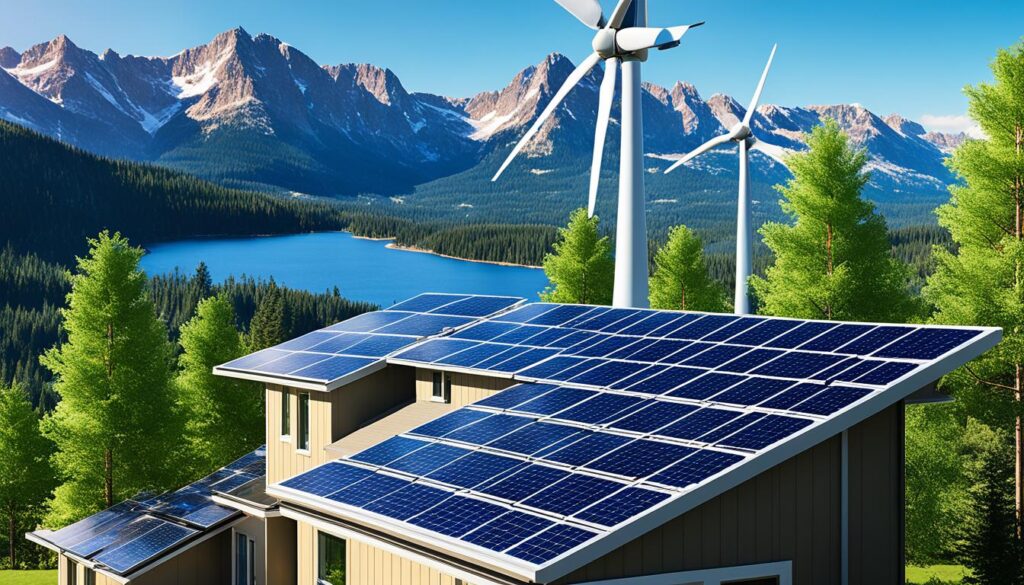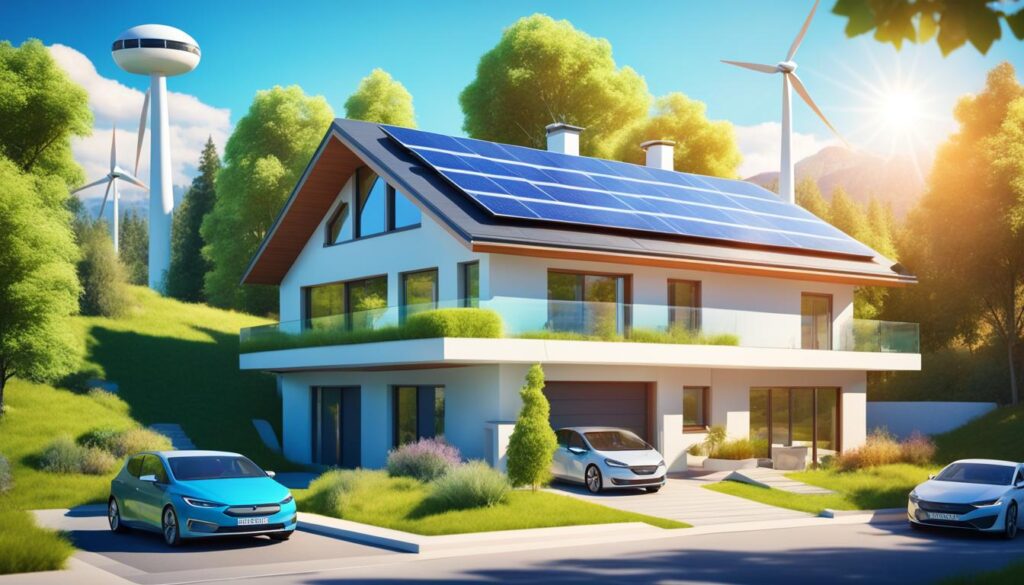In the world of renewable energy, a new solution has come to light – the Hybrid Solar System. This technology mixes solar photovoltaic panels with energy storage. It creates a system that is both versatile and efficient, changing how we power our homes and businesses.
Hybrid solar systems bring together grid-tied and off-grid features. They let users use the sun’s energy while staying connected to the power grid. By using solar panels and batteries, these systems offer a dependable and affordable way to manage energy needs.
These systems can store extra solar energy for later. This means you always have power, even when you need it most or when the grid goes down. By using solar and battery tech together, users can save more on energy and cut down on carbon emissions.
Key Takeaways:
- Hybrid solar systems combine solar photovoltaic panels with energy storage, offering a versatile and reliable power solution.
- These systems integrate grid-tied and off-grid capabilities, allowing users to optimize their energy usage and savings.
- Hybrid solar systems provide a continuous supply of power, even during grid outages, thanks to their energy storage capabilities.
- By combining solar and battery technology, hybrid solar systems enable users to reduce their reliance on the traditional power grid and their carbon footprint.
- Hybrid solar systems are the latest innovation in the renewable energy sector, offering a promising future for sustainable power generation.
Unveiling the Hybrid Solar System Revolution
The world of renewable energy is changing fast, and hybrid solar systems are leading this change. They mix solar PV technology with advanced battery storage. This creates a flexible and dependable energy solution that’s changing how we view renewable energy.
Combining Solar and Battery Storage
Hybrid solar systems use the sun’s energy and store it in big batteries. This way, people and businesses can use solar energy even when they need it most or when the grid is down. With solar energy storage and battery backup, these systems keep the power on, making energy more secure and reliable.
Grid-Tied and Off-Grid Capabilities
Hybrid solar systems are super versatile. They can switch between grid-tied and off-grid modes easily. When connected to the grid, they can send extra solar power back, lowering energy bills. But if the grid goes down, they can keep the power on, keeping you safe from power cuts.
Adding energy management system tech makes hybrid solar systems even better. It lets people and businesses watch and control their energy use. This means they can save more money and use energy more efficiently.

“Hybrid solar systems represent a game-changing advancement in renewable energy technology, empowering users to harness the sun’s power while maintaining reliable and uninterrupted access to electricity.”
Hybrid Solar System: The Future of Renewable Energy
The world is moving towards renewable energy, and hybrid solar systems are leading the way. They mix photovoltaic panels with battery storage and grid-tied tech. This combo offers a full solution to solar energy’s ups and downs.
These systems can store extra solar power in batteries and switch between grid-tied and off-grid modes easily. Thanks to energy management system and net metering, users can use energy wisely. They can also earn credits for sending extra energy back to the grid.
Hybrid solar systems are super flexible. They fit the energy needs of homes, businesses, or factories. They combine solar power with battery storage for a steady supply of renewable energy. This means you get power even when the sun isn’t shining.
Adding hybrid solar systems to our energy mix helps us use renewable energy better. As they grow, they’ll help keep the grid stable and make renewable energy more common. This will cut down our use of fossil fuels and help our planet.
“Hybrid solar systems represent the future of renewable energy, seamlessly blending the power of solar with the reliability of battery storage and grid-tied capabilities.”
Hybrid solar systems are a big step forward in our search for clean, efficient energy. They use solar power, battery storage, and grid tech together. This approach meets the changing energy needs of people, communities, and the earth.
Maximizing Energy Efficiency with Hybrid Solar Systems
Hybrid solar systems are changing how we use energy at home and in businesses. They have a smart energy management system that makes sure we use solar power first. This way, we use less traditional energy and save money.
Hybrid solar systems are great at using net metering. When they make more electricity than we need, we send the extra back to the grid. This gets us credits that lower our energy bills. It’s a smooth way to use solar power and save money over time.
Energy Management and Net Metering
The energy management system in hybrid solar setups keeps an eye on how we use energy. It makes sure we use solar power well. It also uses the grid only when needed and sends extra energy back for credits.
- Intelligent monitoring and control of energy flow
- Prioritization of solar-generated electricity
- Net metering for earning credits on excess energy
- Significant cost savings through reduced grid reliance
Using hybrid solar systems, we can get really good at using energy and save money over time. These systems are good for the planet and give us a steady, green energy source for the future.
“Hybrid solar systems are the future of renewable energy, delivering unparalleled efficiency and cost-savings for homeowners and businesses alike.”
Conclusion
Hybrid solar systems are changing the game in renewable energy. They mix grid power with energy independence. This gives people in India a dependable, affordable, and green way to power their homes and businesses.
These systems can store extra solar power and switch between using the grid and being off-grid. This means they offer top-notch energy security and help save money over time.
As more people want clean energy, hybrid solar systems are set to be the norm. They make it easier to live off the grid and help us all move towards a greener future. By using these systems, we can take charge of our energy use. This helps India work towards energy freedom and a cleaner planet.
Choosing hybrid solar systems is a big step towards a future powered by renewable energy. It’s a smart and cost-saving choice for homes, businesses, and the planet. By going for hybrid solar, India can set the pace in the shift to a sustainable, secure energy future.
FAQ
What is a hybrid solar system?
A hybrid solar system uses solar panels and battery storage together. This mix allows for both grid-tied and off-grid use. It stores extra solar power for later use, making power reliable and affordable for homes and businesses.
What are the key features of a hybrid solar system?
Hybrid solar systems have many benefits. They combine solar panels and battery storage. They switch easily between using the grid and being off-grid.
They also allow users to send extra energy back to the grid and get credits. An advanced system helps manage energy for savings. And, they keep power on during outages.
How do hybrid solar systems work?
Hybrid solar systems make electricity with solar panels and save extra power in batteries. When there’s a lot of solar energy, it uses this power first. It only uses the grid when needed.
When the grid goes down or demand is high, it switches to off-grid mode. It uses stored power to keep electricity flowing.
What are the benefits of a hybrid solar system?
Hybrid solar systems offer many advantages. They make energy use more independent and reliable. They save money through net metering and smart energy use.
They also cut down on carbon emissions and improve energy security during outages. Plus, they can adjust to changing energy needs and grid conditions.
How do hybrid solar systems compare to traditional grid-tied or off-grid solar systems?
Hybrid solar systems are better than traditional ones in many ways. Grid-tied systems depend on the grid and can lose power during outages. Off-grid systems rely only on batteries and can run out of power.
Hybrid systems offer the best of both worlds. They can switch between using the grid and being off-grid. This means users can save more energy and have a steady power supply, even when the grid fails.

